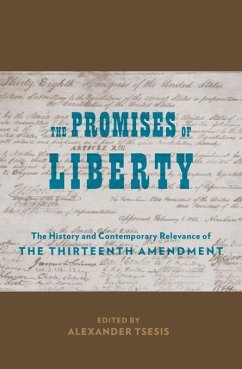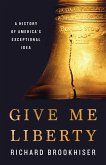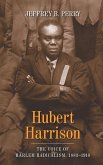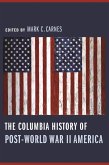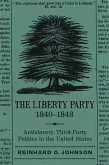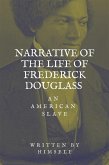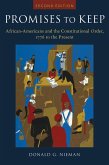In these original essays, America's leading historians and legal scholars reassess the ratification of the Thirteenth Amendment and its relevance to issues of liberty, justice, and equality. The Thirteenth Amendment abolished slavery in the United States, reasserting the radical, egalitarian dimensions of the Constitution. It also laid the foundations for future civil rights and social justice legislation. Yet subsequent reinterpretation and misappropriation have curbed more substantive change. With constitutional jurisprudence undergoing a revival, The Promises of Liberty provides a full portrait of the Thirteenth Amendment and its potential for ensuring liberty.
The collection begins with Pulitzer Prize-winning historian David Brion Davis, who discusses the failure of the Thirteenth Amendment to achieve its framers' objectives. The next piece, by Alexander Tsesis, provides a detailed account of the Amendment's revolutionary character. James M. McPherson, another Pulitzer recipient, recounts the influence of abolitionists on the ratification process, and Paul Finkelman focuses on who freed the slaves and President Lincoln's commitment to ending slavery. Michael Vorenberg revisits the nineteenth century's understanding of freedom and citizenship and the Amendment's surprisingly small role in the Reconstruction and post-Reconstruction periods. William M. Wiecek shows how the Supreme Court's narrow interpretation once rendered the guarantee of freedom nearly illusory, and the collection's third Pulitzer Prize winner, David M. Oshinsky, explains how peonage undermined the prohibition against compulsory service.
Subsequent essays relate the Thirteenth Amendment to congressional authority, hate crimes legislation, the labor movement, and immigrant rights. These chapters analyze unique features of the amendment along with its elusive meanings and affirm its power to reform criminal and immigration law, affirmative action policies, and the protection of civil liberties.
The collection begins with Pulitzer Prize-winning historian David Brion Davis, who discusses the failure of the Thirteenth Amendment to achieve its framers' objectives. The next piece, by Alexander Tsesis, provides a detailed account of the Amendment's revolutionary character. James M. McPherson, another Pulitzer recipient, recounts the influence of abolitionists on the ratification process, and Paul Finkelman focuses on who freed the slaves and President Lincoln's commitment to ending slavery. Michael Vorenberg revisits the nineteenth century's understanding of freedom and citizenship and the Amendment's surprisingly small role in the Reconstruction and post-Reconstruction periods. William M. Wiecek shows how the Supreme Court's narrow interpretation once rendered the guarantee of freedom nearly illusory, and the collection's third Pulitzer Prize winner, David M. Oshinsky, explains how peonage undermined the prohibition against compulsory service.
Subsequent essays relate the Thirteenth Amendment to congressional authority, hate crimes legislation, the labor movement, and immigrant rights. These chapters analyze unique features of the amendment along with its elusive meanings and affirm its power to reform criminal and immigration law, affirmative action policies, and the protection of civil liberties.
Dieser Download kann aus rechtlichen Gründen nur mit Rechnungsadresse in A, D ausgeliefert werden.

